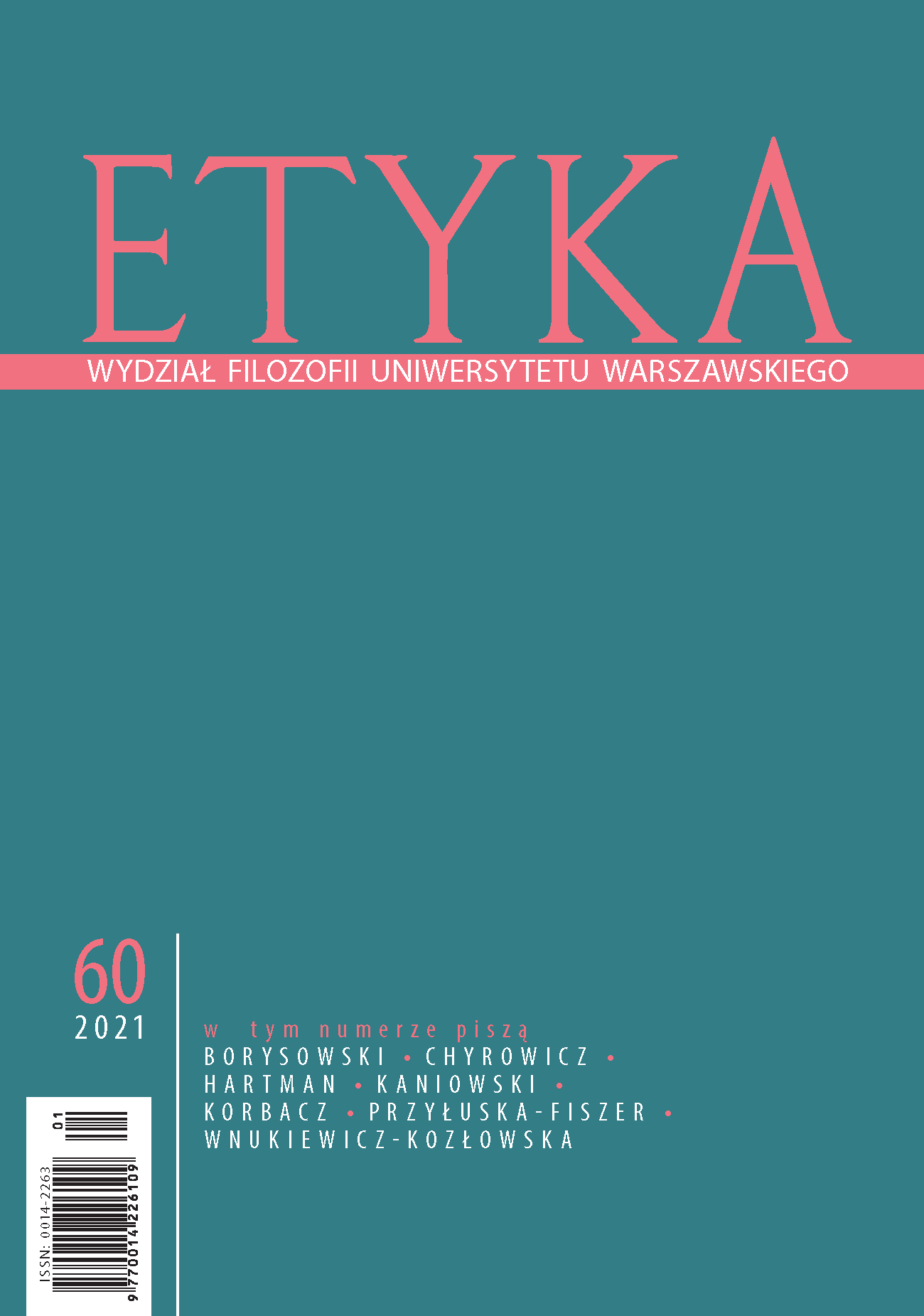Nauczanie Kościoła katolickiego a polska debata bioetyczna
Abstrakt
Doktryna moralna Kościoła katolickiego odnosząca się do kwestii bioetycznych stanowi jedno ze stanowisk obecnych w polskiej debacie bioetycznej, co wydaje się zrozumiałe zważywszy na deklarowaną przynależność większości Polaków do tegoż Kościoła. Katoliccy moraliści stoją na stanowisku, że reprezentowana przez nich doktryna nie ma czysto religijnego charakteru. Odwołują się do kategorii prawa naturalnego, wyprowadzając z niego obowiązek szacunku dla życia każdej istoty ludzkiej, od momentu jej powstania aż do naturalnej śmierci, stąd zdecydowanie negatywnie oceniana jest aborcja, eutanazja, a także proceder niszczenia ludzkich zarodków. Obok punktów spornych istnieją też takie kwestie bioetyczne, w których stanowisko Kościoła katolickiego nie budzi w społecznej debacie kontrowersji, np. transplantologia.
Bibliografia
De Dios Vial Correa, J., Sgreccia, E. (red.). 2005. The Dignity of Human Procreation and Reproductive Technologies; Anthropological and Ethical Aspects. Proceedings of the Tenth Assembly of the Pontifical Academy for Life (Vatican City, 20-22 February 2004). Vatican: Libreria Editrice Vaticana.
De Dios Vial Correa, J., Sgreccia, E. (red.). 1998. Identity and Statute of Human Embryo. Proceedings of Third Assembly of the Pontifical Academy for Life (Vatican City, February 14-16, 1997). Vatican: Libreria Editrice Vaticana.
De Dios Vial Correa, J., Sgreccia, E. (red.). 2003. The Nature and Dignity of the Human Person as the Foundation of the Right to Life. The Challenges of the Contemporary Cultural Context, Proceedings of the Eighth Assembly of the Pontifical Academy for Life (Vatican City, 25-27 February 2002). Vatican: Libreria Editrice Vaticana.
De Dios Vial Correa, J., Sgreccia, E. (red.). 2004. Ethics of Biomedical Research in a Christian Vision. Proceedings of the Ninth Assembly of the Pontifical Academy for Life (Vatican City, 24-26 February 2003). Vatican: Libreria Editrice Vaticana.
Eijk, W.J., Hendriks, L.M., Raymakers, J.A., Fleming, J.I. 2014. Manual of Catholic Medical Ethics, tłum. M.R. van der Berg, J. Raymakers. Ballarat Connor Court Publishing.
Fisher, A. 2012. Catholic Bioethics for a New Millennium. New York: Cambridge University Press.
Kelly, D.F. 2007. Medical Care at the End of Life. A Catholic Perspective. Washington DC: Georgetown University Press.
Laffitte, J., Carrasco de Paula, I. (red.). 2010. The New Frontiers of Genetics and the Risk of Eugenics. Proceedings of the Fifteenth Assembly of the Pontifical Academy for Life (Vatican City, 20-21 February 2009). Vatican: Libreria Editrice Vaticana.
Machinek, M. 2007. Spór o status ludzkiego embrionu. Olsztyn: Wydawnictwo Uniwersytetu Warmińsko-Mazurskiego w Olsztynie.
Sgreccia, E. 2012. Personalist Bioethics. Foundations and Applications, tłum. J.A. Di Camillo, M.J. Miller. Philadelphia: The National Catholic Bioethics Center.
Sgreccia, E., Carrasco De Paula, I. (red.). 2006. Quality of Life and the Ethics of Health, Proceedings of the Eleventh Assembly of the Pontifical Academy for Life (Vatican City, 21-23 February 2005). Vatican: Libreria Editrice Vaticana.
Sgreccia, E., Laffitte, J. (red.). 2007. The Human Embryo Before Implantation. Scientific Aspects and Bioethical Considerations, Proceedings of the Twelfth Assembly of the Pontifical Academy for Life (Vatican City, February 27 February - 1 March 2006). Vatican: Libreria Editrice Vaticana.
Sgreccia, E., Laffitte, J. (red.). 2009. Alongside the Incurably Sick and Dying Person: Ethical and Practical Aspects. Proceedings of the Fourteenth Assembly of the Pontifical Academy for Life (Vatican City, 25-27 February 2008). Vatican: Libreria Editrice Vaticana.
Wróbel, J. 1999. Człowiek i medycyna. Teologicznomoralne podstawy ingerencji medycznych. Kraków: Wydawnictwo Księży Sercanów.
Pobrania
Opublikowane
Numer
Dział
Licencja
Prace publikowane w czasopiśmie ETYKA udostępniane są na podstawie licencji Creative Commons Attribution No Derivatives 4.0 International (CC BY-ND), tj. uznanie autorstwa-Bez utworów zależnych. Oznacza to, że Autorki i Autorzy zachowują autorskie prawa majątkowe do utworów i wyrażają zgodę, aby ich prace były zgodnie z prawem ponownie wykorzystywane do dowolnych celów, także komercyjnych, za wyjątkiem tworzenia utworów zależnych (dzieł pochodnych), bez konieczności uzyskania uprzedniej zgody ze Autora lub wydawcy. Artykuły mogą być pobierane, drukowane, powielane i rozpowszechniane z zastrzeżeniem konieczności poprawnego oznaczenia autorstwa oraz oryginalnego miejsca publikacji. Autorzy zachowują prawa autorskie do wspomnianych utworów bez innych ograniczeń.



